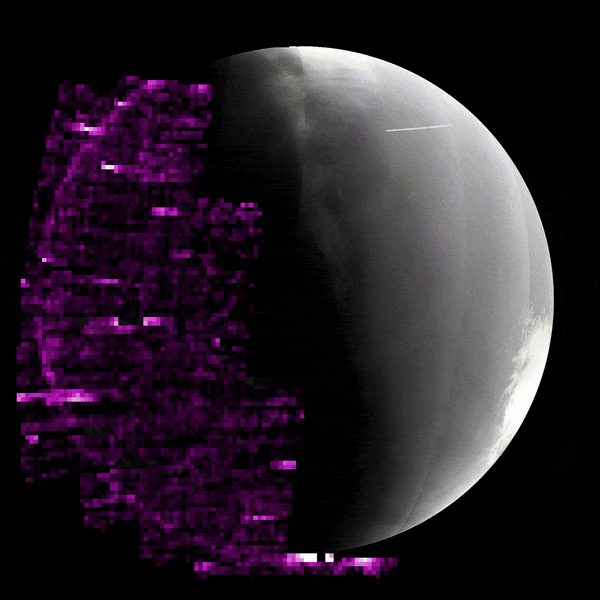Planets
An Ancient Asteroid Smashed Into Jupiter's Moon Ganymede and Tipped It Over, Study Finds
The cataclysmic impactor was 20 times the size of the rock that wiped out the dinosaurs on Earth
Our Moon Was Likely Covered in a Magma Ocean Long Ago, and New Data From India's Lunar Rover Supports That Theory
Soil composition measurements from the Chandrayaan-3 mission reveal white rock called ferroan anorthosite, which would have floated to the surface in an ocean of magma
A Rare 'Super Blue Moon' Will Be Visible Monday Night: What Does That Mean?
Tonight’s full moon will be bigger and brighter than usual, and it’s the third of four full moons this summer
Mars Hosts a Giant Reservoir of Water Underground, We Just Can't Easily Reach It, Study Finds
The water is enough to cover the Martian surface in a mile-deep ocean, but it's beyond the reach of drills for now, according to researchers
Humans Could Warm Up Mars for Space Travelers by Spraying Tiny Metal Rods Into Its Atmosphere
Researchers propose a new technique for making the Red Planet more habitable by engineering heat-trapping nanoparticles from Martian dust
NASA's Curiosity Rover Accidentally Discovers Sulfur Crystals on Mars
The rover’s wheel cracked open a rock and revealed pure elemental sulfur, which researchers have never seen on the Red Planet before
Astronomers Propose New Criteria to Classify Planets, but Pluto Still Doesn't Make the Cut
The new definition would define planets based on mass, rather than more ambiguous shape and size characteristics
This Nearby Exoplanet Is Hot, Dangerous—and Smells Like Rotten Eggs
Located about 64 light-years away from Earth, the world is the first place astronomers have detected hydrogen sulfide outside our solar system
Here’s What We’ve Learned About Saturn Since Cassini Entered Its Orbit 20 Years Ago
The Cassini-Huygens mission increased our understanding of the planet’s rings and moons
Jupiter's Signature Red Spot May Have Evolved More Than Once
The planet's massive storm, known as the Great Red Spot, seems to be different from a spot first observed at roughly the same location in the 17th century, a new study finds
Mars Was Hit With a Solar Storm Days After Earth's Aurora Light Show, NASA Says
Studying this event could hold lessons for scientists about how to protect astronauts from radiation on future trips to the Red Planet
Astronomers Discover Water Frost on Mars' Tallest Volcanoes
On early winter mornings, a thin layer of ice forms in craters atop the Red Planet's towering peaks, near its equator, according to a new study
These National Parks Are Hosting Astronomy Festivals in 2024
Get outside, ditch the light pollution and marvel at the cosmos on these protected public lands
Missed the 'Parade of Planets'? These Upcoming Alignments Will Likely Be Better, Anyway
Astronomers tempered expectations of the celestial event this week, pointing to others in the near future as more exciting opportunities for sky watchers
Venus Might Still Have Active Volcanoes, as Recent Lava Flows Suggest 'Ongoing' Eruptions
Astronomers have again discovered evidence of recent volcanic activity on Earth's sister planet in data from the 1990s
The Seven Most Amazing Discoveries We’ve Made by Exploring Jupiter
The giant planet is a world of extremes
Astronomers Discover an Atmosphere on a Hot, Rocky Exoplanet With an Ocean of Magma
It's the best evidence yet of an atmosphere on a rocky planet outside our solar system, researchers say, and studying the distant world could provide insight into Earth’s early days
The Seven Most Amazing Discoveries We’ve Made by Exploring Mercury
Only two robotic missions have made it to the Swift Planet, but they were crucial for upending many false assumptions of that sun-scorched world
Meteorites Are Becoming Harder to Find as They Sink Into Antarctica's Melting Ice
The disappearing space rocks are burying valuable clues into the history and composition of our solar system, according to a new study
Why We Love Eclipses
Two perspectives on the astronomical phenomenon that has fascinated humans for as long as we’ve been watching the skies
Page 1 of 17
:focal(400x400:401x401)/https://tf-cmsv2-smithsonianmag-media.s3.amazonaws.com/filer_public/38/a4/38a41af1-fdd7-48bc-b0a8-6d68a83c2d84/moon_ganymede_by_noaa.jpg)
:focal(800x602:801x603)/https://tf-cmsv2-smithsonianmag-media.s3.amazonaws.com/filer_public/07/9f/079f304b-c1e9-4f1f-8e4f-08cd8c46b768/volcanic_planet_5_r_1.png)
:focal(2048x1375:2049x1376)/https://tf-cmsv2-smithsonianmag-media.s3.amazonaws.com/filer_public/81/d4/81d43b86-bf2b-4552-b96c-4fd10f5e797e/moonrise-at-vasquez-rocks-credit-nasa-preston-dyches-cc-by-nc-20.webp)
:focal(960x960:961x961)/https://tf-cmsv2-smithsonianmag-media.s3.amazonaws.com/filer_public/0f/aa/0faacf87-c7f5-4345-89ac-9576979286d8/pia02653large.jpg)
:focal(320x320:321x321)/https://tf-cmsv2-smithsonianmag-media.s3.amazonaws.com/filer_public/a7/42/a742946b-581b-4795-bb7b-a2d00f2888d5/pia08636orig.jpg)
:focal(1024x575:1025x576)/https://tf-cmsv2-smithsonianmag-media.s3.amazonaws.com/filer_public/38/bb/38bb7442-9862-40b8-89ff-a095e76d9abb/1-pia26309-curiosity-views-16x9-1.jpeg)
:focal(1051x567:1052x568)/https://tf-cmsv2-smithsonianmag-media.s3.amazonaws.com/filer_public/00/e2/00e2a283-4c55-4442-8304-5382614f5ef3/pia11800large.jpg)
:focal(3500x1983:3501x1984)/https://tf-cmsv2-smithsonianmag-media.s3.amazonaws.com/filer_public/1e/06/1e06b8cf-be0d-4df1-b7ab-53283700323d/hd_189733bs_atmosphere.jpg)
:focal(401x206:402x207)/https://tf-cmsv2-smithsonianmag-media.s3.amazonaws.com/filer_public/5f/4a/5f4a37a1-a7f2-4c3d-a1bb-54ac0c6d5f06/pia21345_modest.jpg)
:focal(827x543:828x544)/https://tf-cmsv2-smithsonianmag-media.s3.amazonaws.com/filer_public/30/00/3000c3d2-1519-4375-a014-bcc8b5d5fed1/pia21985orig.jpg)

:focal(845x459:846x460)/https://tf-cmsv2-smithsonianmag-media.s3.amazonaws.com/filer_public/ef/ff/efffec3e-d663-4701-8116-ec653f5d3ca9/perspective_view_of_frosty_olympus_mons.png)
:focal(1000x671:1001x672)/https://tf-cmsv2-smithsonianmag-media.s3.amazonaws.com/filer_public/30/c3/30c3cf9b-cc6f-4c33-888b-41af2a71fe2d/cf36e43e-596b-4104-a59e-9426cb826b92original.jpg)
:focal(4000x2095:4001x2096)/https://tf-cmsv2-smithsonianmag-media.s3.amazonaws.com/filer_public/03/64/03647ce0-0203-473c-8ba1-c5cc4725de7e/gettyimages-182910299.jpg)
:focal(625x351:626x352)/https://tf-cmsv2-smithsonianmag-media.s3.amazonaws.com/filer_public/d9/43/d9438ca3-e253-40a4-b6eb-142189c2657c/1-jpegpia00108.webp)
:focal(800x602:801x603)/https://tf-cmsv2-smithsonianmag-media.s3.amazonaws.com/filer_public/03/9e/039e6fe8-6beb-47e0-8f10-65cd3b2f5781/main_46577295485_94943f56db_o_web.jpg)
:focal(1000x571:1001x572)/https://tf-cmsv2-smithsonianmag-media.s3.amazonaws.com/filer_public/fc/90/fc9022fc-7d85-4a46-9b9c-826922f39b14/stsci-01hwqz4bjsgtdzc7fpdtvtnztc.jpg)
:focal(720x542:721x543)/https://tf-cmsv2-smithsonianmag-media.s3.amazonaws.com/filer_public/11/a8/11a8f779-8331-4682-8899-246f3c2815ba/main_esa_ssiow_iridescent_mercury_web.jpg)
:focal(930x700:931x701)/https://tf-cmsv2-smithsonianmag-media.s3.amazonaws.com/filer_public/2f/af/2faf224c-16ac-4efd-8bb9-e19576c87625/arctic2.jpg)
:focal(700x527:701x528)/https://tf-cmsv2-smithsonianmag-media.s3.amazonaws.com/filer_public/c9/98/c9981180-9665-4e4e-8390-93dcf586d711/smithmag-podcast-s02-ep04-eclipse-article.jpg)